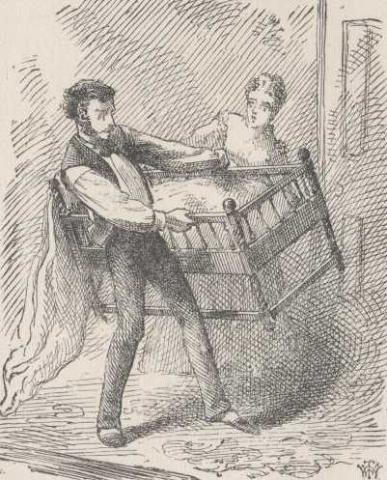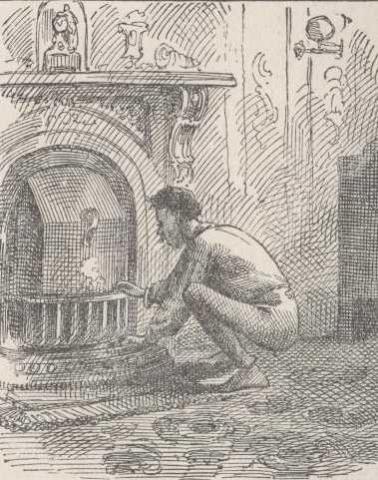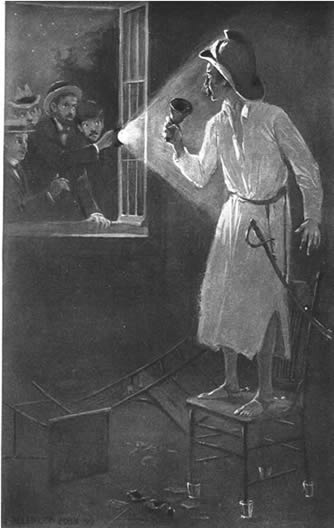Copyright 2020 by Gary L. Pullman
The
McWilliamses Stories
Over a period of
thirty-seven years, Mark Twain published three short stories about a
married couple named the McWilliamses. Caroline (later,
Evangeline—did her husband remarry?) is emotional, superstitious,
argumentative, and gullible; Mortimer is rational, put-upon,
long-suffering, and henpecked. Foils to one another, the spouses'
characters, as well as the incidents in which they become involved,
provide the fodder for Twain's humorous treatment of them.
The first story,
“Experience of the McWilliamses with Membranous Croup,” was
published in 1879; the others, “Mrs. McWilliams and the Lightning”
and “Mrs. McWilliams and the Burglar Alarm,” followed in 1892
and, posthumously, in 1916, respectively.
“Experience
of the McWilliamses with Membranous Croup”
In the first of these
stories, Mortimer is relating his and Evangeline's experience with
membranous croup, “an acute obstructive laryngitis in young
children, usually between the ages of three and six.” (The Free
Dictionary by Farlex).
Characterized by “a high-pitched cough and difficulty in
breathing,” the condition can be caused by either bacteria or a
virus ((The Free Dictionary).
The
story starts with what appears to be a reference to an incident
unrelated to the ailment: Mortimer suggests that their daughter ought
not to be “chewing” a stick of pine. His comment prompts an
argument from Evangeline for no other reason, according to Mortimer,
than the fact that she, like married women in general, “cannot
receive even the most palpably judicious suggestion without arguing
it.” As evidence to support her view that the chewing of wood, in
fact, has medicinal value, Evangeline references the statement of
unidentified “doctors” who “all say that the turpentine in pine
wood is good for [a] weak back and the kidneys.” When Mortimer
presses her on this astonishing declaration, he learns that their
child is not afflicted with either condition and further, that
Evangeline never implied any such thing.

Like
the situations in Twain's other McWilliamses stories, this one
establishes a situation that lends itself to repetitions of behavior
that are but variations upon themselves, as the couple take
extraordinary and absurd measures to protect the health of their
children, the ailing Penelope and their baby, moving the crib in and
out of the nursery, nearer and farther from the fire in the couple's
bedroom fireplace, adjusting the temperature of their room up and
down, dismissing and recalling the nurse, and Caroline's awakening
Mortimer from his sleep to carry out a series of absurd actions
related to her nearly hysterical concern for their children. Through
such repetition, both in this story and in the other two of the
series, Twain extends the narratives' opportunities for humorous
treatment, the humor resulting as much from situations involving such
repetition of actions as from the opposing traits of the couple's
characters.

During
the course of the story, Twain employs a number of techniques, many
of which are also used in his other McWilliamses stories:
Irony
and exaggeration: In
response to Caroline's refusal to concede the validity of his logic
that the pine wood stick that Penelope chews is not of any
nutritional or medicinal value, Mortimer says, “Say no more, my
dear. I now see the force of your reasoning, and I will go and order
two or three cords of the best pine wood to-day.”
Simile:
“sleeps like a graven image”
Comparison: “you know no more what you are talking
about than the child unborn”
Misdirected
concern: Caroline is more
concerned about the condition of her furniture and the family's cat
than she is that of Mortimer.
Irony:
Caroline insists that Mortimer sleep, letting her take care of
Penelope and the baby, but she keeps waking him to ask that he
undertake another useless task
Redundancy:
“I did not finish, because I was interrupted.”
Irony,
through impossibility:
“he must come, dead or alive.”
Irony through motive: “Very few married men have such
an experience as McWilliams's and so the author of this book thought
that maybe the novelty of it would give it a passing interest to the
reader.”
Situational irony: Penelope's condition is not
the result of the membranous croup, after all, the doctor determines,
but of her having swallowed “a bit of pine,” from which she “got
some little slivers in her throat.”
“Mrs.
McWilliams and the Lightning”
My
personal favorite of the three, “Mrs. McWilliams and the
Lightning,” is based on the wife's fear of lightning. Now known as
Evangeline, Mrs. McWilliams awakens her sleeping husband with her
panicked shouts of “Mortimer! Mortimer!”
The
story makes good on Mortimer's claims, at the outset of the
narrative, that his wife's “fear of lightning . . . . is something
pitiful to see.”
As
in the previous McWilliamses story, the wife is emotional,
superstitious, argumentative, and gullible, while Mortimer is
rational, put-upon, long-suffering, and henpecked. Only the name of
the wife differs in regard to the characters; children are mentioned,
but they play no substantial part in the plot.
Evangeline,
who does her own share of arguing, all Mortimer seems to do, in
response to her claims and her concerns is to “argue it, and argue
it, and argue it!” Of course, in doing so, from a logical point of
view, he is correct. He is right, for example, that a man cannot “be
ashamed when he is asleep.” He is right that swearing does not
cause lightning, and he is right that saying “confound it” is not
swearing. He is right that ;light does not attract lightning. He is
right that not having said his prayers does not cause lightning—or,
for that matter, the past occurrences of earthquake and yellow fever
that Evangeline blames on his swearing. He is right that his standing
in front of their fireplace cannot result in lightning. Nevertheless,
his reasoning does not win the argument; Evangeline remains
persuaded, because of her readings of esoteric texts, that her
husband is wrong and that his behavior is, in effect, a lightning rod
that could bring destruction down on them both.
Evangeline's
retorts to Mortimer's rational appeals show the tactics she uses to
manage and subdue her husband; she charges him, directly or
indirectly, with shame, carelessness, recklessness, profligacy,
argumentativeness, irreverence, irrationality, and willful ignorance.
Although it may be that he does not accept the validity or justice of
such criticisms, Mortimer seems more concerned with allaying
Evangeline's fears than with winning his argument, which suggests
that he loves her, despite her eccentricity, just as her expressions
of concern for him and their children implies her devotion to him and
their family.
Another
source of the humor in this story is Evangeline's attempt to
translate an esoteric German text that is clearly incomprehensible to
her (and to Mortimer). Believing the book to offer guidance
concerning how to deflect lightning, she orders Mortimer to outfit
himself in metal objects: his fireman's helmet, his military saber,
and his spurs, and to ring their dinner bell, all while standing on a
chair. The ringing of the bell causes his neighbors to appear,
demanding to know “what in the nation is the matter here?”
The
story's punchline comes as the neighbors notify Mortimer that the
lightning and thunder he and Evangeline have perceived is, in fact,
merely the sound and the flashes of the cannon fire celebrating
Garfield's nomination for president. Outside, he is told, “It is a
beautiful starlight night.” Due to his wife's superstition and
fear, Mortimer has become the laughingstock of the neighborhood and
appears himself to be superstitious and fearful.
This
story also uses repetition ans a means to both extend the humor and
to create a variety of humorous effects. However, this time Twain's
use of repetition seems more sophisticated, allowing a greater
diversity of sources of information that he can use to produce
humorous observations and descriptions, such as science,
superstition, rationality, emotionalism, religious beliefs,
skepticism, pseudoscience, marital relationships, “book-learning,”
private vs. public conduct, personal beliefs, and social and
political influences.
In
the course of the story, Twain uses these specific techniques to
effect humor:
Ironic
juxtaposition: “a woman
. . . could face the very devil himself—or a mouse”
Concealed
humor: Twain tucks
humorous observations away among seemingly serious statements, the
more to surprise his readers.
Mutual
foils as the major source
of conflict: a rational husband and an hysterical wife
Superstitious
beliefs based on books:
“all the books say that . . . .”
Mistaking
correlation for causation:
cursing causes the flash of lightning that immediately follows
Mortimer's “swearing”
Verbal
irony: “absolutely at
the mercy of Providence”
Simile:
“as dark as the inside of an infidel”
Repetition:
lightning flashes and thunderbolts allow the extension of the
humorous situation through variations of wit and humor; additionally,
the husband's alleged profanity has caused not only the current
thunderstorm but previous occurrences of earthquakes and yellow fever
Situational
irony: a superstitious
and irrational wife charges her husband with irrationality, and his
actions (lying in bed, standing before an “open fireplace,”
“swearing,” standing near a window, approaching a door, standing
close to a wall, lighting a match, donning his pantaloons, failing to
say his prayers, singing, admitting a draft of air into the bedroom,
turning on water, failing to order a feather bed) attract lightning
Categorical
absurdity: the wife
regards the use of the word “blessed” as an instance of profanity
Personification:
lightning is a “marksman”—with bad aim, yet
Dubious
cause-and-effect relationships:
the wife's shutting herself inside the boot-closet with a book causes
her husband to enjoy “a moment's peace”
Ridiculous,
unnecessary action causes destruction:
chasing a cat destroys $400 worth of furniture
Complex
process with ludicrous goal
results in absurd actions and husband's becoming a laughingstock
Ignorance
compounded by arrogance:
The McWilliamses' inability to understand a book written in a foreign
language results in ad-libbing ridiculous “translations”
Mistaken
effects: cannon fire, not
storm, causes effects perceived by the McWilliamses as lightning and
thunderbolts
Preliminary,
apparent punchline trumped by actual, climactic punchline:
not only is Mortimer a laughingstock (preliminary, apparent
punchline), but he is also mistaken about the apparent cause of the
“lightning” (cannon flashes) and thunder (cannon fire) (actual,
climactic punchline)
“Mrs.
McWilliams and the Burglar Alarm”
In
“Mrs. McWilliams and the Burglar Alarm,” Twain uses the same
structure of repetition to milk the situation of its humor. Despite
the presence of an expensive, sophisticated burglar alarm, burglars
repeatedly burglarize their house. Repeated repairs and adjustments
to the burglar alarm merely make the situation worse or introduce new
problems. First, the alarm fails to prevent burglaries; then,
adjusted (a huge gong is added to the contraption), the alarm works
too well, awakening the entire household every time the cook starts
the day at five o'clock. In fact, it works so well, it literally
wakes the dead. Another repair, due to a series of false alarms,
results in so many burglaries that the residents no longer respond to
the alarm, surrendering the run of the house to the thieves. The
burglar alarm company seeks to remedy this problem by replacing the
burglar alarm's clock every three months, which is not only expensive
(as all the previous repairs have been), but each effort is “always
a failure.”

This
story features the following uses techniques:
Spurious cause and effect: “we found we had a
little cash left over, on account of the plumber not knowing it.”
Irony through contrasting motives: “I was for
enlightening the heathen . . . .[the motive sounds noble], for I was
always unaccountably down on the heathen somehow” (but it is really
base).
Definition: “whenever I want a thing, and Mrs.
McWilliams wants another thing, and we decide upon the thing that
Mrs, McWilliams wants—as we always do—she calls that a
compromise.”
Punchline: The burglars finally steal the burglar
alarm itself.
Play on words: “swear at—sear by, I mean.”
Riff on “summer”: “They [alarm firm
workers] promised to have the whole thing finished in ten days. They
began work, and we left for the summer. They worked a couple of days;
then, they left for the summer. After which the burglars moved in,
and began their summer vacation.”
Personification:
clocks “would take it [the burglar alarm] off again as soon as your
back was turned”
Verbal irony: “those things [burglar alarms] are made
solely in the interest of the burglars”
What
Could Go Wrong?
One
theory of humor finds the source of humor in situations in which a
character perceives that something is wrong. Obviously, Twain takes
this approach in his McWilliamses stories. Being struck by lightning
may not be funny, but as Twain shows, being hysterical about the
possibility, which is fairly remote, can be hilarious. What's “wrong”
isn't the lightning itself (which, in fact, in the story, never
actually occurs), but the irrational fear of it and the behavior that
such fear produces. “Mrs. McWilliams and the Lightning” is an
account of the multiple results of such hysteria. Twain uses the same
approach in his other two stories: In “Experience of the
McWilliamses with Membranous Croup,” Evangeline is terrified that
her daughter and baby may die from the disease, and her fear fuels
the story's humorous effects, as she puts Malcolm (and the rest of
her household) through its paces in an effort to save her children,
who, as the doctor reveals at the end of the tale, never were at
risk, since neither Penelope nor her sibling actually had the
membranous croup or any other sickness. “Mrs. McWilliams and the
Burglar Alarm” uses the same formula, but, this time, it is an
object, more than the characters of the story, that goes wrong, the
burglar alarm failing to work at all, working too well, or working at
inappropriate times. If such an approach works for Twain, it could
work for others, provided, of course, they have Twain's considerable,
perhaps unparalleled, gifts as a humorist.






